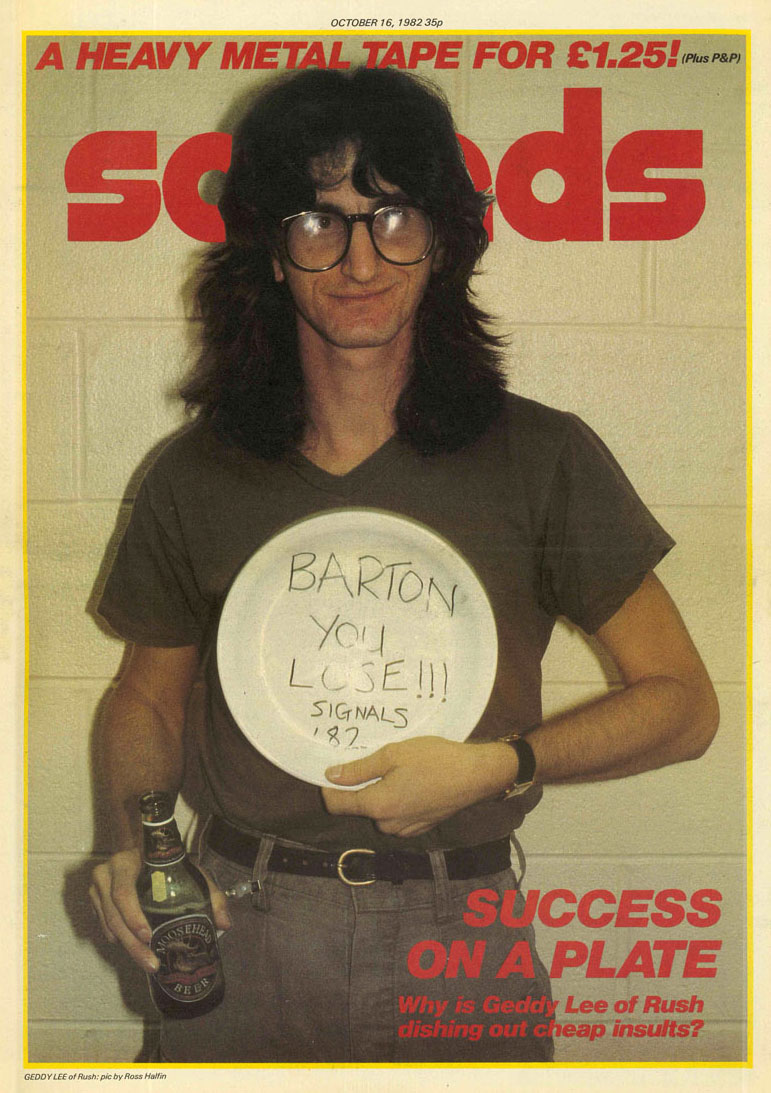 |
Adrenalin Rush Sounds Magazine September 11th, October 16th, and December 18th, 1982 by Pete Makowski |
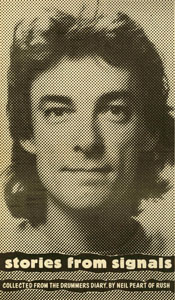
Click Any Image to Enlarge
from Sounds Magazine - October 16th, 1982
I SUBDIVISIONS
Le Studio, September, 1981
We were getting a little bored with inactivity. During the mixing of "Exit... Stage Left" there was really not much for us to do except say "it sounds good" or "it doesn't sound good".
I had been working down in the little studio, cleaning and renovating an old set of Hayman drums that were kicking around, and had started working on a "Jack Secret" song with Jack and Skip from the crew. Geddy and Alex soon joined in on keyboards and rhythm guitar, and we later recorded the song ("Tough Break") up in the studio.
I had also been working on some lyrics for a few days and had come up with "Subdivisions", an exploration of the background from which all of us (and probably most of our audience) had sprung.
One afternoon as I was idly polishing my car, Alex and Ged returned from working at the little studio, set up a portable cassette player right there in the driveway, and played me the musical ideas they had come up for it.
"It's kinda weird, but what do you think?"
"Let me hear it again."
I listened closely, picking up the variations on 7/8 and 3/4, the way the guitar adopts the role of rhythm section while the keyboards take the melody, returning to bass with guitar leading in the chorus, then the mini-moog taking over again for the instrumental bridge.
"I think it's great."
They smiled.
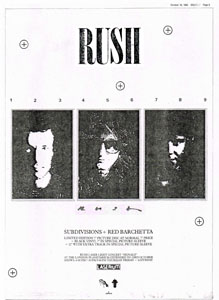 II THE ANALOG KID
II THE ANALOG KID
Schooner Orianda, British Virgin Islands, January,1982
We had been tracking up the Sir Francis Drake Channel most of the day, on a leisurely zig-zag course to Virgin Gorda. At the wheel was our stalwart guest helmsman, Geddy, with Captain Mike and myself reclining in the stern and offering directions. We all watched the pennant halfway up the starboard shrouds, gauging our attitude to the wind. Up forward, First Mate Keith and Deck Steward Tom stood by the sheet for the Yankee jib, ready to wrestle it across the deck for the upcoming tack.
Captain Mike decided that we were close enough to land now to make the manoeuvre, so that if we ran out of wind he could walk to shore! He gave the helmsman his instructions:
"Okay, call out 'prepare to come about', and spin the wheel hard over to starboard."
"That's right, right?"
"Right!"
"prepare to come about"
Captain Mike laughed his best "dirty old sailor" laugh; "They've got to hear you up there, YELL it out!"
"oh ... PREPARE TO COME ABOUT!!!"
"Better" ...
Last night Geddy played me some of the things he had been working on at home. He had an electronic instrumental that would become the basis for "The Weapon", a new extended intro for "Vital Signs" live , and a couple of other ideas that we haven't yet used.
That night as we lay at anchor in Virgin Gorda, Geddy and I went down below after dinner, and I showed him some of the work that I had been doing. I had written "The Analog Kid" as sort of a companion piece to "Digital Man", which had been written last fall up at Le Studio. He liked it, and we discussed different ways it could be treated musically. As we often do, we thought it would be interesting to take the opposite approach to what the lyrics would suggest;make it a very up-tempo rocker, with some kind of a dynamic contrast for the choruses. We also looked at a rough version of "The Weapon" that I had put together, and agreed that it would need some more work. He told me what he liked, and what he didn't like, and gave me some good points to go to work on. We put an end to the "shoptalk" and went back to our holidays.
III CHEMISTRY
Sound Check, Somewhere USA, Moving Pictures Tour, 1981
Around 4:15 we all made our way on to the bus. Kevin had checked us out of the hotel, and stowed the luggage in the bay, as that night we would be driving on to "Somewhere-Else USA." Whitey put the bus in gear and drove off toward the hall.
In "road-time", this is first thing in the morning, and there was not much to say beyond the perfunctory "good day". Geddy rustled the local paper, checking the latest baseball scores, Alex flicked disinterestedly through a "Plane and Pilot" that he had read twelve times, and I smoked a cigarette in a sleepy stupor. Curtains closed against the world, we rode away to the gig.
At the hall, we checked out each of the instruments separately; boom-boom-boom, tap-tap-tap, thud-thud-thud, strum-strum-strum, woof-woof-woof, test-test-test, et cetera, and then gradually moved into a little spontaneous creation. This tour for the first time our sound man, Jon, has been taping our soundcheck meanderings, and it had proved very fruitful to us. On this particular day in "Somewhere USA" we will unknowingly write a whole song at once, each of us playing a different part. While Geddy plays what will become the keyboard melody for the bridge section, Alex is playing the guitar riff for the verses, and I'm playing the drum beat for the choruses. Just like that!
When Alex and Geddy get together to sift through the soundcheck tapes they will find a whole song written here, and will arrange it and make a demo that will be very close to the finished song.
Lyrically, this is the first time that all three of us have collaborated on the words to a song. Geddy and Alex together came up with the title and concept for the song, wrote out a few key phrases and words that they wanted to get in, than passed it along to me for organization and a little further development. When all of this is put together, we have what was probably the easiest song to write on the album. Once again, our "Research and Development" department of sound check jams comes through.
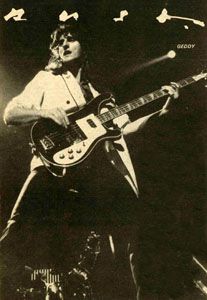 IV DIGITAL MAN
IV DIGITAL MAN
The Grange, Muskoka Lakes, Ontario, March,1982
At this time of year there is still no sign of spring up here. The lakes and ground are still blanketed by about four feet of snow, the temperatures are steadily sub-zero, and one is obliged to dress rather like an Arctic explorer to go outdoors.
We are up here for a month to work on new songs. We have a row of chalets to stay in, and the winterized upper room of a barn to work in. An open fire is friendly company for me as I spend the afternoons working on lyrics, while Alex and Ged are over at the barn working on musical ideas. The cold, crisp air and the thick shroud of snow create a very magical atmosphere in which to work, especially walking back at night when the full moon gleams on the diamond-dusted snow. Some people have nothing good to say about winter, but I find it very beautiful. One night Larry and I borrowed a pair of snowshoes, and went out walking on the frozen lake. The moon shone down on the bluish snow almost like daylight, and the dry air was so cold it pinched your nostrils shut. That might sound like a nightmare to you, but to me it was a dream-world!
"Digital Man" had actually been started last fall at Le Studio, when we had put together the lyrics and the music for the verses and the "ska" style bridges, but we had been unable to come up with the right combination for the choruses. After much head scratching, we finally came up with the sequencer pattern, and the guitar and drum patterns to go with it. We were all very pleased wit the dynamic and unusual nature of the part, it was so different for us; but our "objective-ear", co-producer Terry Brown was not so enthused.
Now, this has happened before, when we all get excited about a part, only to have Broon come along and tell us "it sucks". (He's a diplomatic guy!) Usually, we either see the error of our ways, or give up and let the "old man" have his way. This time however, we were so sure that we were right that we refused to give in. We talked and talked about why we liked it, how we heard it being recorded, and what it could do for the song as a whole. We wore away at him inch by inch, until he got tired of hearing about it, offered a few half-hearted suggestions, and relented. "After all" he admits, "I have been wrong before!" Or, as his daughter Victoria put it so well: "I can't help it if you're always wrong!" No respect.
V THE WEAPON
Stately Dirk Manor, Somewhere-north-of-Toronto, December,1981
With a Roland drum machine and assorted synthesizers, Geddy and friend Oscar secret themselves in Ged's music room to create some music of a highly confidential and experimental nature. Among the Top Secret projects which they produce is the basic foundation for this song, including a highly mysterious and bizarre drum pattern which Oscar coaxes out of the drum machine. (I'm supposed to learn how to play that?)
Well, I do love a challenge, and once we start to tackle this at one of the rehearsals, I discover that if I play totally backwards, and bend my hands a few ways they don't normally go, I can do it. The shame of being reduced to learning from a machine! However, I must admit, I would never have come up with something like that on my own!
With all this and more to accomplish with my hands, it is no compromise to let my bass drum foot play a steady "four", which is also something I never thought I could do. This also brings the feel of the song perilously close to a (shudder) d-d-d-dance song, like, you know, disco! Treason! Treason! Kill the traitors! They wrote a song you can dance to! Will you ever forgive us? (No.)
It was fun to do, though. It's so contrary to the mood suggested by the lyrics, and such a different approach for us, that it is a very satisfying piece of work. It's an all-out production number that we can play live, so I'm sure all the "disco kids" will soon be coming to our concerts. Ha!
VI NEW WORLD MAN
Le Studio, Quebec, May,1982
At this point the basic tracks for the other seven songs were finished, and we have enough for an album, but we have always wanted to write another song for this one. We want more! There are moral reasons why an album shouldn't be too short, but there are technological reasons why it shouldn't be too long. What shall we do?
We decided to write another song, and if it turns out to be too long, we won't put it on, but if we come up with something short enough, we will have an eighth song.
So, thus was born "Project 3:57"! In order for another song not to cause great inequality between the length of the two sides, and not to cause us trouble in the mastering of the album, it had to be under four minutes. When was the last time we wrote a song under four minutes, you ask? That's a good question, and one that we asked ourselves too. But we figured we had nothing to lose; if it's too long we simply put it away and save it for another record. (Actually "Different Strings" and "Circumstances" were both under four minutes, and "Closer to the Heart" and "Madrigal" were both under three, we can do it!) Target - 3:57!
I spent a couple of days wringing out my notebook, and tying in a few of the themes from other songs, and came up with a straightforward, concise set of lyrics consisting of the two verses and the two choruses, and then we went to work.
We decided to play this one fast and loose, writing it in one day and recording it the next! We wanted to capture a spontaneous, relaxed feel for this one, not even spending much time getting the sounds together. Thus, it could stand in contrast to the rest of the album, being much more raw and "live" in its affect. Two days is very close to a record for us to write and record a song. The quickest ever was "The Twilight Zone" from our "2112" album. That was written and recorded in one day. But then that whole album was completed in under a month; things are different now!
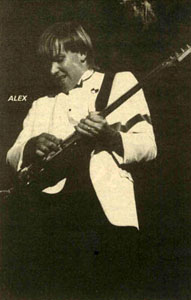 VII LOSING IT
VII LOSING IT
Le Studio, Quebec, June,1982
Like the verse sections for "The Analog Kid", the main theme for this song came from Alex's holiday exercises (we all did our homework!). We worked out the verses and choruses while we were in rehearsal, and made a skeletal demo of it with just keyboards and drums, then put it away until we got to the studio.
We had talked for a while about getting Ben Mink to play electric violin somewhere on this album, and this seemed like the perfect track. Once we got into the studio, we developed the jazzy solo section, recorded the basic track, and gave Ben a call. Fortunately he was able to get away from his group, "FM" for a couple of days, and bring his unique instrument up to play his heart out for us.
Ben's violin! That's a story in itself! There a several little cows grazing in there, as well as a "Beach Party" scene, complete with little Frankies and Anettes. All of this illuminated by four green Christmas lights that provide the necessary inspiration for such a piece. Sounds crazy? You bet!
We worked him hard, squeezed him dry, and threw him away. He just stood there in front of the console, taking it and giving it, fueled by occasional sips from a bottle of C.C. Not only the monumentally fantastic solo did we demand, but we had him multiple-tracking an entire string section as well. That'll teach him to be our friend!
VIII COUNTDOWN
Cape Kennedy, Florida, April,1982
We were there! It wasn't easy, but we made it! We had a long-standing invitation to the first launch, and always swore that we would be there no matter what. Little did we know!
On April 9th we flew into Orlando on a day off, checked into a hotel, and slept until about four A.M., when we had to leave for our rendezvous at the Air Force Base near the Cape. There we met our liaison man, who conducted us safely into the "V.I.P." zone (Red Sector A) in the pre-dawn hours. We stood around, listening to the announcements, as the sun rose higher and hotter in the sky. We were due to play that night in Dallas, so we couldn't wait much longer. Finally they announced that the launch would be scrubbed for that day. The computers weren't speaking!
Well, we ran for the car, and our daring driver sped off, around the traffic jams, down the median of the highway, and got us to the airport barely in time.
The next night we had a show in San Antonio, after which we drove off immediately, clambered into a hired jet, and flew straight back to Florida. This time the launch took place on schedule, and it was SOMETHING!! (More about that in the song.) Again we raced backed to the plane, and flew off once more, back to Fort Worth where we had a show that night. Fortunately the day after that was a day off, so we had a chance to catch up on all that sleep!
I remember thinking to myself as we flew back to Fort Worth after a couple days without sleep: "We've got to write a song about this!" It was an incredible thing to witness, truly a once-in-a-lifetime experience. I can only hope that the song comes even close to capturing the excitement and awe that we felt that morning.
So, that's the album. I hope that you will all enjoy it. We put a lot into it, including about a month of our summer holidays - (didn't quite get finished on time!) We tried to break some new ground for ourselves; explore some different types of songs and sounds; while continuing the directions begun by "Permanent Waves" and "Moving Pictures". I guess it will be like always; some will love it, some will hate it, and some will say:
"Rush?? Signals?? What the hell is that??"
* An explanation is in order, we feel, for the lack of connection between this week's Sounds front cover and the Rush feature within. This is due to what we in the trade lovingly refer to as 'another Makowski f*** up'. See, despite having had about a month to write the thing, our Pete failed to deliver his Rush piece in a readable form last week. With the dreaded deadline doom looking on the horizon, we had a colour front cover already on the presses at the printers but nothing to go with it!
In the end we were forced to go ahead with this, a reprint of Neil Peart's Rush US tour programmer notes, telling of the making of the band's latest album 'Signals'. Lucid and revealing they may well be, but they don't explain why Geddy Lee wrote 'Barton You Lose' on a china plate, do they? We'll leave that to Pete Makowski to explain in the real Rush feature, which he's promised to deliver to us next week. Or the week after...
Pete Makowski finally delivers the goods on RUSH
from Sounds Magazine - December 18, 1982
"'Signals' is definitely the direction that we've wanted to go in for a long time. It's something that comes from maturity and having been through the whole techno side of things. We've played in all those weird times and made all those big points that we've wanted to make. Now it seems that there's a bigger concern for communication and that's what this album is all about." - Geddy Lee
"'Signals' is a little more accessible and everything's a little more straightforward and a little more concise. It's been done in terms that everyone can relate to, you don't have to sit down and go through everything.
"We never really were that serious, you do a couple of things that may seem that way and you're labelled no matter what you do. You're always labelled as something like, 'Here's Rush, a 'heavy metal heady' type band!' I don't know, most of the time you couldn't give a f***, you have a good time and that's it!" - Alex Lifeson
"I guess that 'Signals' has more to do with writing about people and less about ideals. 'Permanent Waves' was probably our first album that was in touch with reality - it was about people dealing with technology instead of people dealing with some futuristic fantasy world or using symbols for people. Now I'm trying to make those symbols into real people and real conflicts in real people's lives. I still want to write about ideals, I'm not interested in writing about the sewer of life." - Neil Peart
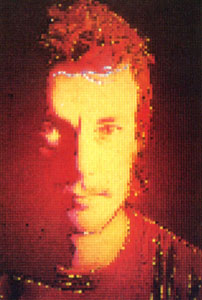 As you may already have gathered from the verbiage above, the latest Rush album marks quite a radical change in direction for the group. Essentially it's one helluva step away from the conceptual niche they carved for themselves when they played the bombastic chord progression that kicked off '2112'. In fact the initial move away from the Disney/fantasy world, as chief lyricist Neil Peart pointed out, came with 'Permanent Waves'.
As you may already have gathered from the verbiage above, the latest Rush album marks quite a radical change in direction for the group. Essentially it's one helluva step away from the conceptual niche they carved for themselves when they played the bombastic chord progression that kicked off '2112'. In fact the initial move away from the Disney/fantasy world, as chief lyricist Neil Peart pointed out, came with 'Permanent Waves'.
Prior to hearing 'Spirit Of The Radio', this humble scribe must admit to being one of the media snobs who avoided the group like a plague; having long ago written them off as some deviant be-robed pomp alternative to the Ramones. There was no way, no how that I could even begin to stomach those quirky/epileptical time changes and those nauseating pseudo sci-fi/knitting pattern fantasy lyrics. As I saw it, Rush were insulated in some bizarre self-created world, more often than not literally festooned with smartass anagrams for monickers and planets with extremely silly names.
In fact as far as I was concerned Rush were doing no more than filling in a vast cavity left by the sudden demise of bands like Yes and ELP. They seemed to be catering for people who were hungry for music to act as a soundtrack to their Tolkien and Moorcock influenced sensibilities.
It wasn't until recently that I could credit the band with any originality or, in turn, credibility as artists. From the release of the aforementioned 'Waves' onwards, the group themselves demonstrated a personal need for change. A new direction, an injection of soul and feel, a return to the simpler forms of music, generally a more basic approach.
As guitarist Alex Lifeson pointed out, this proved to be a hard task, equal to if not more arduous than any of their other normally more highbrow and complex musical exercises:
"You can take five different key signatures and go through them all in one song - big deal! So we had to spend a lot of time working it out and doing it. We tried putting something together in 4/4 time for four minutes that had all the elements of something we once would have done in ten minutes. It's a little different... it's a little tougher."
Rush seem very eager to take risks and the interviews and shows witnessed in the US, on a tour still in its formative/teething period, left moi with no doubts that here is a triumvirate of true musicians in the innovative sense of the word.
In no way are they the dull/tedious technocrats I had them marked down as, they are in fact one of the few of a dying breed of artists whose efforts actually point to a brighter/hopeful future. Yes, they are creative.
And what's more they still appreciate their audience as much as they are appreciated. Neil Peart accurately summed up the situation: "The only way you can be objective about yourself is to try and put yourself into a fan's perspective, which for us is easy because our whole appeal grew up as being fans of other people."
But enough of this! Let's get on with our regularly scheduled feature and visit Denver, Colorado, where Rush are experiencing a certain amount of difficulty...
As with many of the horrendous events that occur in one's life, Denver was one of those situations that should have been immediately erased from the memory banks. But unfortunately it happened and therefore has to be documented. Although it was obvious from the moment the plane touched down that this was definitely the place not to be in.
Only minutes before Rush were due to kick off proceedings in Denver disaster struck when the synthesisers packed up completely. Anyone familiar with Rush's set knows that this spells disaster, especially as they have recently added what seems like a truckload of Moogs to help them recreate 'Signals'.
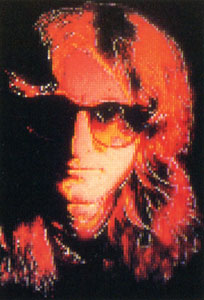 The band had a very serious problem on their hands. As the roadcrew scurried around the stage like amphetamined worker ants doing overtime, everyone knew deep down that there was only one person who was really capable of rectifying the damage done to the hyper-delicate mechanisms - the inventor, a boffin who unfortunately lived a few hundred miles away.
The band had a very serious problem on their hands. As the roadcrew scurried around the stage like amphetamined worker ants doing overtime, everyone knew deep down that there was only one person who was really capable of rectifying the damage done to the hyper-delicate mechanisms - the inventor, a boffin who unfortunately lived a few hundred miles away.
The show was already running an hour late and the natives were beginning to get restless. American audiences are pretty damn rowdy at the best of times, and this unruly mob was no exception.
You may think because Rush happen to play music which requires the onlookers' patience, alertness and virtually constant attention that this would reflect on their followers, but no, like almost any Yankee crowd all this lot wanted to was 'PARTEEEE!!!'
It's a ritual that requires a vast quantity of drugs and/or alcohol to send them into a stupor. Some people misjudge their consumption and are easily distinguished as they look like horizontal heaps of flesh that seem to be blissfully wallowing in pools of vomit. Thankfully any oncoming feelings of foreboding doom were quickly cut short by the announcement informing us that the group were about to go onstage.
"Thanks for putting up with all this bullshit," shouted a genuinely concerned Geddy Lee as the band wasted no more time and got right down to business, kicking off with 'Spirit Of The Radio'.
The audience response was nothing short of ecstatic and almost drowned out the music. But it would be pointless reviewing this show as it didn't represent the band's full performance. As the group admitted themselves, they bluffed their way through it. But I must add that, considering the unnerving circumstances and the sheer hell the group must have been going through, the whole thing came off remarkably well.
Geddy and the rest of the band were visibly stunned by the punters' response and they let the proceedings run into overtime, meaning they would have to pay vast sums of money to the local union. But this marked their show of respect for the fans.
It was hardly surprising that the atmosphere afterwards was, uh, hardly congenial. The dressing room felt more like a hospital waiting room, the inhabitants resembling friends and relatives of a patient, who had just sprung his mortal coil. Geddy Lee apologised, but at the same time made it clear that he was in no mood for an interview. So although it was originally intended for us to see only the one show, there was no hesitation from either party when the opportunity arose allowing us to stick around until the next big date.
Maybe we should include a subheading here: 'How Ross Halfin Survived In A Dry (that's alcohol free to you, squire) State' or 'The Revenge Of The Osmonds'.
Yes folks! Our next port of call turned out to be none other than Salt Lake City, which is (in)famous for being the home turf of the most obnoxious molars this side of Jaws - the Osmonds.
As you might expect, Salt Lake city is also one big, flat and illuminated contradiction: hypocrisy in action. Although the liquor laws are tight and make prohibition look like a proverbial piss up, these out of date restrictions are responsible for a high alcohol rate in the city. This den of inquity also happens to harbour some of the most sexually repressed women stalking the US, who go wild in demonic proportions when a band arrives in town.
Rush have sold out Salt Lake. Ticket sales so far have indicated that the group could have played two, possibly three nights in the town. It's no big secret that the band's massive growth in popularity has put them in the rare old status of being stadium fillers, although Rush themselves adamantly refuse to play any venue with such a vast capacity. They also have a policy of 'No Festivals'.
As Alex Lifeson says: "We've been offered a ridiculous amount of money to play festivals, but to be quite honest I'd rather stay at home in summer and go swimming with my kids, then sacrifice two months in the winter and play smaller places. The whole band feels that way."
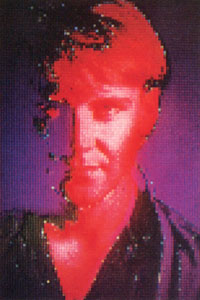 In lot of respects, Rush are the product of an era long gone...
In lot of respects, Rush are the product of an era long gone...
Groups nowadays are generally victims of the corporate way of life. A so-called recession (I emphasise 'so-called' because I firmly believe that, like pollution, this ridiculous state of affairs could be avoided to quite a healthy degree if only people would bother to sit down and reassess the situation) prevails and demands instant results, which in turn prevents any worthwhile talent getting the time to develop.
There's no space for long term investments. To stay afloat nowadays most groups have to compromise themselves to a ridiculous extent in order to get fast sales, immediate response and the necessary success that allows them to stay in the game.
Rush hail from a time when a group's importance lay in their album-selling potential and bands were given quite a few chances before any harsh judgements were passed regarding their future.
A productive and rewarding period, fortunately for them, because as Geddy so astutely points out: "If Rush just appeared now, we wouldn't have a snowball's chance in hell of getting a deal. And you know what's worst about the situation nowadays? There are some albums that have been recorded that will never see the light of day because, after all the effort, the company decides that the product has no commercial potential. That really scares me."
Although Rush go out of their way to maintain a very democratic front, there is no doubt that Geddy Lee is the unofficial frontperson.
His head is one third hair, a third nose, a third dominated by a set of double glazing-type bins that would make Ted Moult cringe with envy.
A self-confessed baseball addict (whose main regret in life at the moment is that he spurned sport in favour of rock and roll during school days), Geddy has a Sahara dry wit that occasionally reminds me of a more laidback version of Robin Williams.
Like the rest of the group, Geddy is extremely proud of 'Signals' and is aware of its significance as a musical transition for the group. I must admit though that he wasn't particularly impressed when I told him that the American radio people had been describing the album as the one 'featuring Geddy Lee without the helium!'.
"If I had a nickel for every insult about my voice, I'd probably be a millionaire... I've had some amazing comparisons, some of the most stupid comments."
Although Geddy is lead vocalist, Neil Peart has almost always been solely responsible for the lyrics. I asked Geddy how he felt about singing somebody else's words.
"Well, it's not as strange as you may think. I mean, I wouldn't sing anything I didn't have any empathy with. A lot of what goes down in the writing process with us has a lot of discussion with it. There isn't anything, whether it's musical or lyrical, that any of us would play unless we thought it was good and had some empathy with what the point was.
"There's a lot of crossovers in the word chores, that's something a lot of people don't realise. Like, with 'Signals', we've all really worked hard on this record and we've tried something real different. Y'know, it's one thing when you sit down and make a record and another thing when you say 'OK, let's not do the same thing again and again, let's try and do something different. We're sort of wading in water a little bit, because we're in a new area."
'Signals' represents quite a change of pace for the band...
Geddy: "I think one of the things that contributed to the way 'Signals' turned out was the fact that we took of about two months in the winter time, stayed in our little rooms, and did our own work. There was a lot of writing, a general gathering of ideas, and when we finally got together we had so much stuff it was ridiculous."
Some of the material was written while you were getting the live album together, wasn't it?
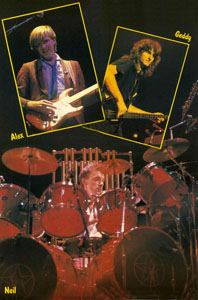 Geddy: "Yeah, we did 'Subdivisions' and 'Digital Man'. Doing a live album is a real boring experience. Live albums are sort of historical, they're painful to do because there's nothing really creative about them. You play the gigs, you record the gigs, and invariably wherever you're recording you stiffen up and it's not the same.
Geddy: "Yeah, we did 'Subdivisions' and 'Digital Man'. Doing a live album is a real boring experience. Live albums are sort of historical, they're painful to do because there's nothing really creative about them. You play the gigs, you record the gigs, and invariably wherever you're recording you stiffen up and it's not the same.
"I really don't think that live albums, at least for us, have ever represented our concerts accurately - there's something loose when there's no pressure of recording and you're just playing for the people..."
Recently you've introduced your brand of reggae which initially appeared on 'Spirit Of The Radio' and now crops up more boldly on 'New World Man'.
Geddy: "Well I know that we are the white man and can't play reggae, it's just something that comes naturally to black people, especially people that are brought up with that kind of music, maybe that's why it's such a fascination for us.
"Reggae is pure feel, it's nothing real technical. You don't have to play well to be able to play it. I think our whole direction has moved towards feel, I notice that was something that was missing on our earlier records. A lot of our earlier records sounded forced. We put all our energies into developing feel and I guess reggae is one way that it's coming out. It's a real kind of uplifting feeling with our frame of mind right now, it just seems to be a good avenue."
How do you mean 'frame of mind'?
Geddy: "I guess it's our desire to bring some fresh air into the band. It's very easy to fall into the trap of producing yourself to death and planning every minute of your life."
You had an opportunity to cash in on your past successes, just by producing/regurgitating deviations of the same theme...
Geddy: "That's what we were in great danger of doing. It would have been the easiest thing in the world to go into the studio and do 'Moving Pictures' all over again, it's too easy to do that. You have to do different things. On this album we wanted to have a lot of variety and I think we've achieved that because just about every song is different."
What do you credit as being a key factor in the success of Rush?
Geddy: "I think it's a combination of things, hard work is the first thing. The desire is to retain a certain quality, not to try and cheat anybody - I think that sort of attitude comes through in our music.
"It's very hard for me to analyse, because there was no real masterplan, I like to think that we try to maintain a realistic, well-balanced outlook in this business. We've avoided burning out so far, because there's been too many bad, sad examples around us - people who've become junkies, lost contact with reality.
"There are bands like Kiss, Aerosmith and all, bands who were getting real big and leading a rock and roll lifestyle. Some of them go up, some of them go down. Some of them lose their minds and turn into junkies. It's scary watching that. I think the three of us have a desire to keep it alive and keep it working and we try and avoid these things where we all become complacent.
"I think, complacency is the biggest fear we all have - making albums we didn't care about or playing a show with a 'who gives a f***' attitude, that's when you've got to say it's time to stop."
And stopping is something that Rush needn't even give a passing thought to, with such a fresh attitude.
At the moment I get the feeling that the band are on the verge of producing an album that will be totally different to anything they've done before and will probably totally oppose the highly predetermined approach of '2112'. If this happens it will be interesting to note the fans' reaction: will they evolve or escape? Only time can answer that one.
A final comment from Geddy: "At the moment we're touring at a pace that keeps it fun. We have a lot of fun touring and we want to work out a balance. That's why England is such a big question mark at the moment as far as when we're gonna play there next. We've just started talking about it. It's just that we constantly seem to be running out of time."
As you can see, the prospect of a Rush British tour hangs very much very much in the balance as far as the near future is concerned. In the meantime you can whet your appetite with some - ahem - graphic descriptions of the Salt Lake show, gleaned from my little red notebook.
With the synthesisers back in full working order (they flew in the creator from LA - problem solved) the band were eager to make up for the shambolic affair that still haunted them from the Denver show. And they did so with a vengenance, as Salt Lake shuddered and shook to a stunning show.
The gig featured every song from 'Signals' with the exception of the haunting, almost balladesque 'Losing It' which the band refuse to play until it features the same cast as on the album, which would mean the addition of Ben Mink, violinist with Canadian outfit FM.
The show opens with rousing rendition of 'Spirit Of The Radio' and already it's apparent that this is going to be a multi-visual treat. Stunning lights blaze from an awesome rig magnificently operated for maximum effect by creator/designer/operator, the multi-talented Howard Ungerleider, with some dazzling effects to highlight segments involving audience participation.
Next there's 'Tom Sawyer' and now our visual/aural senses go into overload with the introduction of an animated backdrop depicting the 'Moving Pictures' cover.
By the time we get to 'Free Will' it becomes apparent that the entire audience knows the lyrics down pat, displaying an almost photographic memory during the introductory singalong. It's obvious that over the years Rush have learnt the art of producing the perfectly balanced set.
Now for some new songs as we make way for 'Subdivisions', driven by that addictive/pulsating drumbeat and highlighted by another entertaining piece of back projection.
The crowd keeps going through bouts of ecstatic adulation as my head peers over and past a sound desk which bristles with modern electronic technology, reminiscent of the gear that surrounds a pilot in a Jumbo.
While Geddy expounds on some Peart-like theorising, Lifeson dances around looking like some kind of demented schoolboy who should have had the lead role in the final act of The Omen - it's that college boy haircut and those cherubic but equally brattish looks.
'YYZ' is what you find emblazoned on your aircraft ticket tag when entering Toronto. It's also the title of what Geddy Lee fondly describes as a 'highly patriotic Canadian tune'. It can be revealed that the percussive intro is in fact an accurate lift of the sequence of signals heard by a pilot as air traffic control gives him permission to land in Toronto.
At this point my note book tells me that there are a lot of the previously-talked-about ethnic rhythms creeping into the sound.
Next up is 'Closer To The Heart', to these ears a fairly anonymous tune although I can see its commercial appeal. Mind you, it's still Light Years away in class from obvious sell outs like Asia, and I must agree with Ged's conclusion of their sound and approach which he summed up perfectly as being: "too contrived - every hair is in place and the audience take to it like candy for a baby".
'Chemistry', 'Analog Kid' and 'The Trees' follow, and then the venue suddenly erupts into a sea of joy as the '2112' Starman appears on the backdrop.
A medley from the epic follows, showing that the band haven't completely abandoned the style of their 'Barton era'.
The excitement that surges throughout the place like a bolt of electricity says bullshit to the recession, these people are as excited and eager to hear some rock and roll as any Woodstock generation and they have a few more braincells to utilise.
Time to get the fans involved as Geddy turns the vastly intricate 'Weapon' into a clapalong accompanied by a crazed rap that makes him the Jerry Lee/Little Richard of the synthesisers while Lifeson is walking on the moon.
"You have nothing to fear but fear itself" - the trim tight asses in front of me go up and down in agreement, like a methedrine yo-yo.
Mind you, it was nice to hear a little humour injected into the proceedings as the 'Temples Of Syrinx' line became "We are the plumbers who've come to fix your sink".
The show ends with some traditional baseball chant blaring out of the speakers. It was a sterling performance, demonstrating Rush's new, feel/rhythm orientated direction.
A parting quote from Geddy: "We've been in Rush for almost the whole of our lives now... where do we go from here? I don't know... I suppose you wouldn't go touring and you wouldn't spend all this time playing for other people if you really didn't care about making some point or just generally communicating. That's what music is... it's a language."
Postscript: And finally, at last, the story of Ross Halfin, the plate and the message 'Barton You Lose'. Remember the October 16 Sounds front cover? Well, the outrageously belated story behind it is as follows...
As you may know, Rush have a total phobia of cameras and do not allow pictures of themselves to be taken anywhere but onstage. Ross Halfin, however, was determined to hustle an offstage session, and this is how he did it...
Halfin being the persistent (and highly ingenious) bastard that he is, decided to accomplish this feat by telling Geddy the following pack of lies:
Halfin claimed that Sounds Editor Geoff Barton had bet him the princely sum of 50 pounds that he would be unable to snap any offstage pictures of Rush. Consequently Geddy, anxious to see Barton out of pocket, relaxed the 'no pix' rule for a moment and posed for around half a dozen photos, holding a plate emblazoned with the words 'Barton You Lose' (the bet, geddit?).
All this for a wager that never really existed. Halfin got his way, and no money ever exchanged hands. Didn't I say he was an ingenious bastard?
from Sounds Magazine - September 11, 1982
Rush 'Signals' (Mercury 633 7234) *** (Three stars)
You know nothing is more frustrating than when a band you know and love, namely Rush, release a weak, below par album, namely 'Signals', especially when you consider Lee, Lifeson and Peart's galaxy of undisputed talent, something which they have always managed to channel into something refreshingly new and adventurous, yet retaining the hard abrasive edges of their formative years.
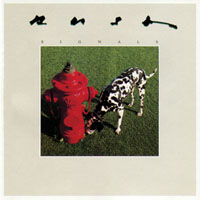 Remember 'A Farewell To Kings' with circa '77, when Rush gave us classics like 'Xanadu', which Geddy Lee made sparkle with his use of the MiniMoog and the bass pedal synthesiser? Remember the sci-fi slanted 'Hemispheres' and the profound 'Permanent Waves' with the increasing use of keyboards and guitar synths as smooth technical icing on the Rush cake of sophisticated and multi-faceted hard rock? Well I'm afraid to report friends that the famous three have over-indulged on the keyboard front this time and consequently 'Signals' is submerged in a soggy swamp of synthesisers, Moogs and the rest, saturating every song with a needless wall of sound which unmercifully strangles Alex Lifeson's guitar and muffles the usually razor sharp edge to Rush's songs to the extent of making them dull. DULL? You may cry in disbelief friends but I kid you not, so read on for details...
Remember 'A Farewell To Kings' with circa '77, when Rush gave us classics like 'Xanadu', which Geddy Lee made sparkle with his use of the MiniMoog and the bass pedal synthesiser? Remember the sci-fi slanted 'Hemispheres' and the profound 'Permanent Waves' with the increasing use of keyboards and guitar synths as smooth technical icing on the Rush cake of sophisticated and multi-faceted hard rock? Well I'm afraid to report friends that the famous three have over-indulged on the keyboard front this time and consequently 'Signals' is submerged in a soggy swamp of synthesisers, Moogs and the rest, saturating every song with a needless wall of sound which unmercifully strangles Alex Lifeson's guitar and muffles the usually razor sharp edge to Rush's songs to the extent of making them dull. DULL? You may cry in disbelief friends but I kid you not, so read on for details...
'Sub Division' [sic], the song responsible for the mysterious album cover I presume, opens the account with buzz of keyboards urged along by Neil Peart's snappy beat to no avail, for it's plagued with such a dull tone that even Geddy Lee's usual soaring and piercing vocals sound sadly subdued.
'The Slide' is temporarily halted by 'The Analog Kid' which, in stark contrast to its predecessor, rattles along in glorious fashion to confidently claim the rize of the album's most exciting track, thanks to Lee's racing thumping bass line Bobbing and weaving behind the attack of Lifeson's fiery lead - yes, you can actually hear Uncle Alex on this one, kids!
'Chemistry' carries on where 'Subdivisions' left off and is little more than an average track placed in a test tube and soaked with a solution of domineering keyboards and monotone vocals, while 'Digital Man' unfolds promisingly into a weird cocktail of half-funky, half-reggae beat, not unlike The Police, though sadly lacking the springy punchy tempo we're used to from Canada's favourite sons.
Flipping the disc over I'd hoped to find something a little more uplifting, but all I was greeted with was 'The Weapon', another weak keyboard-orientated dabble wandering into oblivion in a swirling maze of weird noises. And even though 'New World Man' bucks up the tempo a little with a running exchange of reggae and rock carved around a 'Tom Sawyer' style beat garnished with enough commercialism to help it into the charts and 'Losing It' sprinkles a touch of magic onto the album with its soft, sad texture built around the Moog amidst a superbly atmospheric and melancholic simulated string section shivering in the background to create a centuries old flavour somewhat akin to a Jethro Tull track, building into an orgy of strange sounds before fading solemnly away, 'Signals' fails to match Rush's previous achievements.
The last track, 'Countdown' is the epitome of the reason why; a nonchalant plodder occasionally breaking into a basic trot over a launch controller's countdown jargon. It makes me wonder what's happened to my one time fave trio.
from Sounds Magazine - October 16, 1982
THE TIME has come for someone to speak out against your new style of coverage of the greatest form of music, Hard / Heavy rock. At one time, class, melody and originality seemed to hold some importance, but no longer. Now you seem to revel in hyping bands who look outrageous and who make a blaring maelstrom of old guitar chords and unintelligible, shouting vocals.
You ruined Triumph's attempts at gaining a foothold in this country with various snide comments etc. I advise people to listen to 'Allied Forces' to get a feel for the band.
Motley Crue are raved about endlessly but the 2nd greatest band in the world, Y&T, get mediocre reviews. If the crowds keep an open mind in October, Y&T could turn AC/DC's return into a truly historic event.
The review that the latest Rush album 'Signals' got was a disgusting sell-out. This band is the ultimate in brilliance, style and complete originality. The band change ideas again and are called dull. Since '2112' every album has been different.
Alex Lifeson, the greatest guitarist ever, can be heard, and the keyboards don't dominate overall. They are perfectly entitled to experiment and I pray that this album will dispose of the 'I Bought The Spirit Of Radio' single false fans. Can I remind you who has won your much acclaimed poll twice? Rush, of course.
Saxon are the absolute pits and are an absolute insult to music. Twisted Sister are a pathetic bunch of poseurs who, at Reading, got a big cheer when they invited everyone throwing stuff backstage for a barney to sort it out.
I trust that my comments speak for the majority of true rock fans and you will take note. - The Happy Howler
PS Manowar will return!


